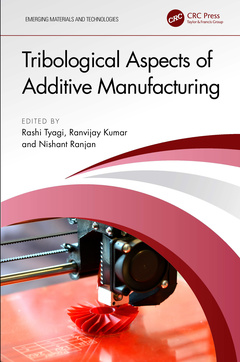Description
Tribological Aspects of Additive Manufacturing
Emerging Materials and Technologies Series
Coordinators: Tyagi Rashi, Kumar Ranvijay, Ranjan Nishant
Language: English
Subjects for Tribological Aspects of Additive Manufacturing:
· 15.6x23.4 cm · Hardback
Description
/li>Contents
/li>Readership
/li>Biography
/li>
Tribological Aspects of Additive Manufacturing provides a technical discussion on the roles of the 3D printing process in processing polymeric-, metallic-, and ceramics-based additive manufactured products in order to improve the tribological properties. It explores design flexibility, waste minimization, and cost reduction.
Emphasizing the various types of additive manufacturing technologies, this book demonstrates how these can effectively influence the tribological properties of additively manufactured components. It examines 3D printing process parameters, carbon fiber reinforcement, natural fiber reinforcement, and surface structure on tribological properties of 3D-printed parts. This book also covers wear and friction resistance of additively manufactured parts prepared with natural fiber and carbon fiber.
This book will be a useful reference for undergraduate and graduate students and academic researchers in the fields of materials science, tribology, additive manufacturing, maintenance engineering, and 3D printing.
1. Tribological Study of 3D-Printed Thermoplastic Polymers. 2. Investigation on Tribology of Additively Manufactured Metal Part. 3. Tribological Properties of Polymer-Reinforced Matrix Composite Prepared by Additive Manufacturing. 4. Tribocorrosion Properties of Additively Manufactured Parts. 5. Future Trends in Laser Powder Bed Fusion Process for Tribological Applications. 6. Role of Natural Fiber-Based Composite on Wear and Friction Resistance. 7. Study on the Effect of Carbon Fiber-Reinforced Composites on Tribological Properties. 8. Impact of 3D Printing Process Parameters on Tribological Behaviour of Polymers. 9. Effect of the Tribological Properties on Structural Applications of 3D-Printed Thermoplastic Composites. 10. Effect of Surface Texturing on Tribological Behaviour of Additively Manufactured Parts. 11. Trends of Tribology in Biomedical Application of Additively Manufactured Parts. 12. Tribological Effect of 3D Printing in Industrial Applications. 13. Emerging Applications of 3D-Printed Parts with Enhanced Tribological Properties.
Dr. Rashi Tyagi is currently working as an assistant professor in University Centre for Research and Development at Chandigarh University. Dr. Tyagi has won CII MILCA AWARD in the field of tribology of electrical discharge coating in 2022. She has completed her PhD in mechanical engineering from the Indian Institute of Technology (Indian school of mines), Dhanbad, India. Her PhD work was focused on surface modification by an electrical discharge process for solid lubrication and enhanced tribological performance. She has completed her MTech from IIT(ISM), Dhanbad, India. She has done her MTech project on the fiber laser cladding of TiN+SS 304 powder to enhance tribological performance. She has published over 21 SCI articles in peer-reviewed international journals, conference proceedings, and book chapters as a first author in the field of 3D printing and tribology of coatings. She has published two articles in Tribology International. She is also a reviewer in several SCI and Scopus indexed journals. She is currently working on tribology of fiber reinforce composite prepared by fused filament fabrication, fused deposition modeling, thermoplastic polymers, and natural and synthetic composites.
Dr. Ranvijay Kumar is an assistant professor in University Centre for Research and Development, Chandigarh University. He has received a PhD in mechanical engineering from Punjabi University, Patiala. Additive manufacturing, shape memory polymers, smart materials, friction-based welding techniques, advance materials processing, polymer matrix composite preparations, reinforced polymer composites for 3D printing, plastic solid waste management, thermosetting recycling, and destructive testing of materials are the skills of Dr. Kumar. He has won prestigious CII MILCA award 2020. He has co-authored more than 55 research papers in science citation indexed journals and 38 book chapters and has presented 20 research papers in various national/internatio
These books may interest you

Surfactants in Tribology, Volume 3 250.90 €



